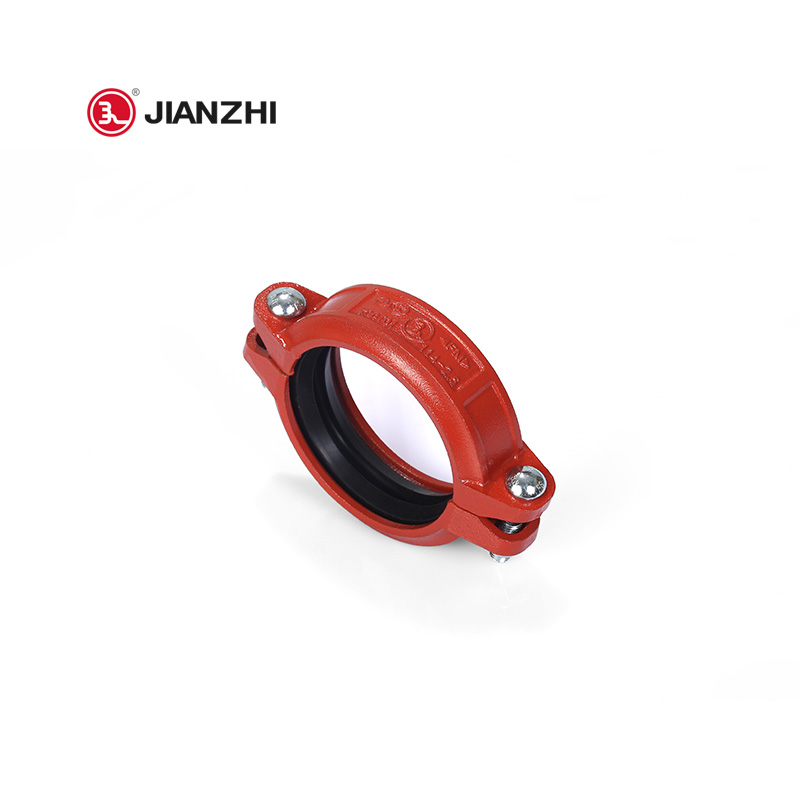Rigid Coupling vs Flexible Coupling: When to Use Each
There are two main types of grooved Coupling: Rigid Coupling and Flexible Coupling.
The characteristic of the Rigid Coupling is that the two adjacent pipe ports connected by
it will not have the relative axial angle change and the displacement on the
axis. This kind of pipe Coupling is mainly used in the riser pipe, empty rack pipe
and other positions of the pipeline system.
The characteristic of the flexible pipe Coupling is that a certain amount of relative angle and
deflection are allowed in the axial direction of the adjacent two pipe ends
connected by it. The allowable angle variable is related to the size of the
pipe mouth, so it is also called a flexible Coupling. This kind of pipe joint is mainly used for buried
pipes or large-diameter pipes. This is because the buried pipes have different
degrees of ground settlement in different sections, and the bottom surface of
the trenches dug for laying the pipes is not necessarily flat, which will make
The two adjacent sections of pipe are not on the same level, and the flexible
pipe Coupling can
completely solve this problem because it can have axial deflection. Due to the
heavy weight of large-diameter pipes, there will be a certain relative angle
between the two ends of the pipe and the middle. Therefore, large-diameter
pipes usually use flexible pipe Coupling, and generally pipes with a diameter of ≥ DN250
are often used.
In engineering construction, due to insufficient technical disclosure
and quality control, workers often make no distinction between rigid Coupling and flexible Coupling and use them at will, which brings
hidden dangers to the reliable operation and normal maintenance of the entire
pipeline system. Such as: domestic hot water system, the temperature difference
between the operating temperature of the system and the installation of the
pipeline can reach 60℃, the length of the steel pipe is 6m, and the thermal expansion
stress will reach 1200kg/mm2. If the pipe is rigidly connected, it will cause
deformation of the bracket and cause damage to the pipe system. Therefore, the Coupling pipe fittings should be
distinguished and selected reasonably.
①
Domestic hot
water pipelines, air-conditioning water pipelines, and open-air pipelines, in
order to effectively compensate the pipeline displacement caused by thermal
expansion and contraction, flexible Coupling must be used in the above three categories. If the
displacement of the expansion section exceeds the total compensation amount of
the flexible Coupling, the installation of metal expansion Coupling should also be considered.
②
Pipes with
little temperature difference, such as indoor fire pipes, can use a large
number of rigid Coupling. However, a certain number of flexible Coupling should be installed in the middle section of the
long straight pipeline to compensate for a small amount of thermal expansion of
the long straight pipeline section and ensure the safe operation of the entire
pipeline system.
③
For elbows and broken-line pipes with
temperature compensation function, flexible Coupling should be installed on the pipe sections where
angular displacement occurs.
④
It is
recommended to use flexible Coupling for pump room piping to reduce noise and weaken
vibration transmission.
⑤
Buried
pipelines should adopt flexible Coupling, which can effectively deal with the local
deformation of the pipeline system caused by uneven settlement.
⑥
The
connection of small arc-shaped pipes must use flexible pipe Coupling. It can be assembled according to
the straight pipe first, and then the pipe can be turned to make it reach the
predetermined angle. However, in any case, the angle of rotation shall not
exceed the value specified in the specification of grooved pipe fittings.
Jianzhi
provides high-quality Rigid
Coupling and Flexible Coupling, welcome to
inquire.



没有评论:
发表评论